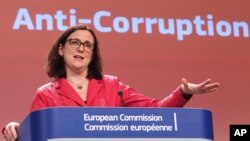PARIS —
Corruption costs European Union countries more than $160 billion a year, undermining their efforts to emerge from its economic crisis.
The EU recently conducted its first survey on corruption and its impact on businesses and citizens in the 28-member bloc.
More than three quarters of Europeans believe corruption is widespread in their country - and it seems their fears might be justified. In its first report on corruption across the European Union, the bloc's executive arm finds corruption touches many parts of daily life here, from procuring government contracts to political party financing.
Presenting the main findings at a news conference in Brussels, European Home Affairs Commissioner Cecilia Malmstroem said corruption's yearly price tag was probably more than 120 billion euros - or about $161 billion. She says that's hurting the bloc's recovery from its economic crisis.
"The report shows clearly that the level of corruption varies from member state to member state, but it affects all member states," she said. "There are no corruption-free states."
The report is based on corruption perceptions and experiences on the part of EU citizens and companies. While it doesn't rank the block's 28 members, it does find that perceptions of widespread corruption are highest in countries like Greece, Spain, Italy and the Czech Republic.
At least one in 12 European say they've experienced or witnessed corruption over the past 12 months. And 40 percent of EU companies consider corruption a problem in doing business.
While the report suggests how countries can crack down on corruption - and offers examples of good practices - it does not call for sanctions or legal reforms. But Malmstroem believes it will generate discussion and action among member states.
"Of course, it takes more than a report to eradicate corruption," she said. "But as we are finding our way out of the economic crisis, this can be a tool. We cannot afford to drag our feet…the price for not acting is simply too high."
Corruption watchdog Transparency International calls the commission's report an "important first step," but EU office head Carl Dolan says it could have gone further.
"It's interesting that there isn't a chapter here on corruption in the EU institutions…looking at things like revolving doors, lobbying, public procurement - all of which are big things for the EU institutions themselves," he said.
Transparency International will be publishing its own report on corruption within those EU institutions in April.
The EU recently conducted its first survey on corruption and its impact on businesses and citizens in the 28-member bloc.
More than three quarters of Europeans believe corruption is widespread in their country - and it seems their fears might be justified. In its first report on corruption across the European Union, the bloc's executive arm finds corruption touches many parts of daily life here, from procuring government contracts to political party financing.
Presenting the main findings at a news conference in Brussels, European Home Affairs Commissioner Cecilia Malmstroem said corruption's yearly price tag was probably more than 120 billion euros - or about $161 billion. She says that's hurting the bloc's recovery from its economic crisis.
"The report shows clearly that the level of corruption varies from member state to member state, but it affects all member states," she said. "There are no corruption-free states."
The report is based on corruption perceptions and experiences on the part of EU citizens and companies. While it doesn't rank the block's 28 members, it does find that perceptions of widespread corruption are highest in countries like Greece, Spain, Italy and the Czech Republic.
At least one in 12 European say they've experienced or witnessed corruption over the past 12 months. And 40 percent of EU companies consider corruption a problem in doing business.
While the report suggests how countries can crack down on corruption - and offers examples of good practices - it does not call for sanctions or legal reforms. But Malmstroem believes it will generate discussion and action among member states.
"Of course, it takes more than a report to eradicate corruption," she said. "But as we are finding our way out of the economic crisis, this can be a tool. We cannot afford to drag our feet…the price for not acting is simply too high."
Corruption watchdog Transparency International calls the commission's report an "important first step," but EU office head Carl Dolan says it could have gone further.
"It's interesting that there isn't a chapter here on corruption in the EU institutions…looking at things like revolving doors, lobbying, public procurement - all of which are big things for the EU institutions themselves," he said.
Transparency International will be publishing its own report on corruption within those EU institutions in April.




